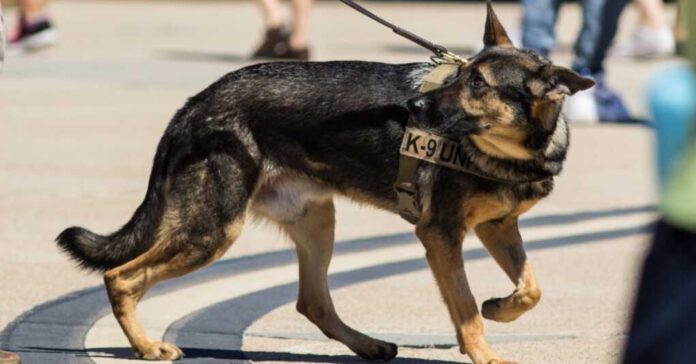
As more states legalize marijuana, many police dogs are finding themselves out of work.
In states like Virginia, where the legalization of adult possession of up to an ounce of marijuana is on the horizon, a significant shift is occurring in law enforcement tactics involving drug-sniffing K-9s. This mirrors a trend observed in other states where marijuana legalization has resulted in the early retirement of these loyal pups.
The use of dogs trained to detect marijuana poses a dilemma, as it threatens individuals’ rights to possess marijuana within legal limits.
Recent changes in laws and police procedures in Virginia, including a separate law prohibiting stops or searches solely based on the odor of marijuana, have rendered K-9 alerts obsolete. Consequently, 13 K-9s have retired from the state, and smaller law enforcement agencies have also disbanded their K-9 units due to financial concerns.
The limitation of these K-9s is that they cannot differentiate between a legal amount of marijuana and an illegal one.
Additionally, the K-9s are trained to detect multiple drugs indiscriminately and to alert their handlers in the same way for each one, meaning the officer cannot tell if the dog is alerting for marijuana or another substance. For instance, a suspect may possess a legal amount of marijuana but may also have illegal substances such as cocaine. It can then be argued that the dog was detecting marijuana, not cocaine, leading to claims of “no probable cause” for the search.
This opens law enforcement to legal battles because the dogs cannot be “untrained” to stop searching for marijuana.
Ohio State Representative Sean Brennan (D-OH) highlighted this unintended outcome resulting from the state’s voters’ decision to legalize recreational marijuana in November. In response, Brennan and Representative Josh Williams (R-OH) proposed a bill to allocate up to $20,000 per dog to law enforcement agencies. The funds would help cover expenses related to acquiring, training, and equipping a new pack of narcotics-detection dogs that do not react to the smell of marijuana.
“The fact that we’re now going to need 300 canines, like overnight in Ohio, the demand for dogs and training is going to be at a premium,” Brennan noted. These specially trained dogs can cost between $7500 and $11,000 each, and the need for them is expected to escalate these costs.
It’s the same story in Missouri, although law enforcement in that state predicted that marijuana would be legalized in the state. In 2018, the state ended cannabis-detection training for their K-9s.
However, some police departments in Missouri are keeping their “perfectly good dogs” and using them for other skills, such as tracking suspects and bomb detection.
In Colorado, a significant legal development emerged when a court ruling raised concerns about the reliability of drug alerts from pot-sniffing K-9s, potentially jeopardizing the admissibility of such alerts in court proceedings. Consequently, Colorado has had to retire many of their police dogs following the legalization of marijuana within the state.
In Washington, D.C., police departments face the same issue of retiring or retraining their drug-sniffing dogs.
Drug-sniffing dogs undergo specialized training to detect a range of substances, including marijuana. This training, which can last from two to six months, follows more comprehensive training in other areas to ensure the dog’s readiness for action. A crucial aspect of the process is certification, requiring the dog and its handler to demonstrate the ability to detect marijuana’s specific odor reliably. Ongoing training and practice are vital after certification, with handlers and dogs working together to maintain and reinforce their skills.
According to the National Police Dog Foundation, the total cost of obtaining and training police dogs can range from $12,000 to $15,000 per pup.
What happens to these four-legged heroes now?
Working canines live with their handlers, who receive compensation from law enforcement agencies for expenses like veterinarian care, food, and toys while the dogs are on active duty.
When police dogs retire, they trade their harnesses for a much-deserved life of leisure. Most retired police dogs continue to live with their original K-9 handler, and many organizations and resources are available to help handlers continue to care for their canine partners.







